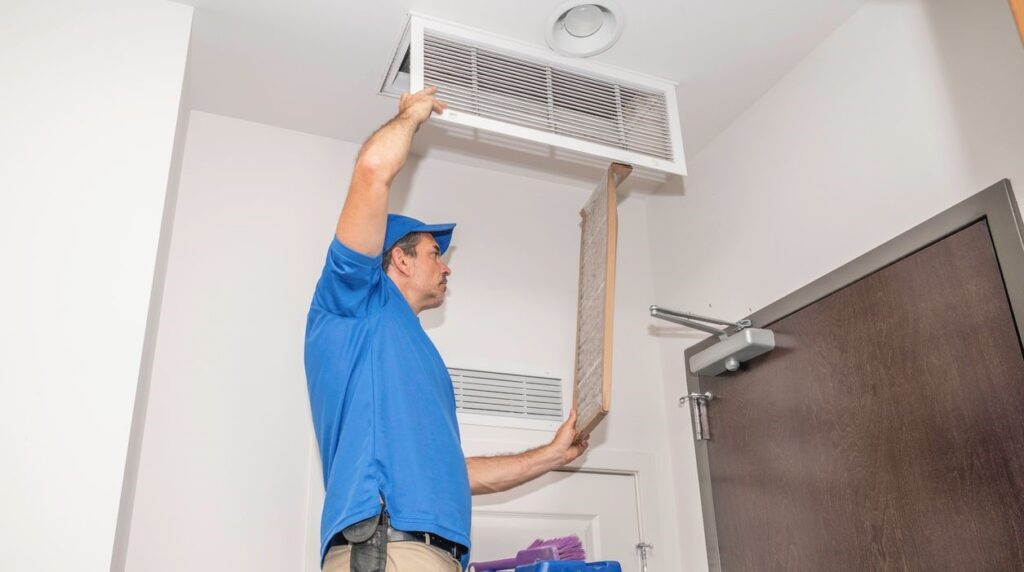Experiencing an unpleasant odor in your home or office? The culprit might be your HVAC system. A smelly HVAC system can be more than just a nuisance; it can indicate underlying issues that may affect air quality and system efficiency. Addressing these smells promptly is crucial for maintaining a comfortable and healthy indoor environment.

Understanding the Common Causes of HVAC Odors
Before diving into troubleshooting, it’s essential to understand the common causes of HVAC odors. By identifying the source, you can apply the right solution effectively.
1. Mold and Mildew Growth
Mold in HVAC systems is a frequent cause of musty smells. The combination of moisture and dust provides an ideal environment for mold growth. Learn more about safe removal of mold from HVAC systems.
2. Clogged Condensate Line
A clogged condensate line can lead to water accumulation, causing foul odors. Regular maintenance can prevent this issue.
3. Dirty Air Filters
Dirty air filters can harbor bacteria and mold, leading to unpleasant odors. Ensure you replace filters regularly.
4. Dead Animals
Occasionally, small animals may get trapped in the ductwork, resulting in a terrible smell. This situation requires immediate attention.
Steps for Smelly HVAC System Troubleshooting
Once you’ve identified potential causes, follow these steps to tackle the issue:
1. Inspect and Clean Ducts
Regular duct cleaning is essential for removing accumulated dust and debris. Consider professional services if necessary. Visit this guide for more information on duct odors.
2. Check for Mold
Inspect areas prone to moisture buildup, such as coils and drip pans, for mold. Use appropriate cleaning solutions to eliminate any growth.
3. Unclog the Condensate Drain Line
Ensure the condensate drain line is clear. Use a wet/dry vacuum to remove blockages, if necessary.
4. Replace Air Filters
Regularly replacing air filters is vital to prevent odors and maintain system efficiency.
Preventive Measures for a Fresh-Smelling HVAC System
Prevention is better than cure. Implement these measures to keep your HVAC system smelling fresh:
1. Schedule Regular Maintenance
Routine maintenance by professionals can identify and address potential issues before they become significant problems. Check out these maintenance tips for mold prevention.
2. Use High-Quality Air Filters
Invest in high-quality air filters that can trap more particles, reducing the chance of odors.
3. Control Humidity Levels
Keep indoor humidity levels in check to prevent mold growth. Dehumidifiers can be particularly useful.
4. Seal and Insulate Ducts
Properly sealed and insulated ducts prevent moisture and pests from entering the system.
When to Call a Professional
Sometimes, DIY methods aren’t enough. If odors persist, it’s time to consult a professional HVAC technician. They have the expertise and tools to diagnose and fix complex issues.
Visit this external resource for more insights into AC smells.
Frequently Asked Questions
1. Why does my HVAC system smell musty?
A musty smell often indicates mold or mildew growth within the system, particularly in areas with moisture accumulation.
2. How often should I change my HVAC filters?
It’s advisable to change HVAC filters every 1-3 months, depending on usage and the type of filter used.
3. Can a smelly HVAC system affect health?
Yes, odors from mold, bacteria, or chemical leaks can affect indoor air quality and potentially impact health.

Conclusion
Maintaining a fresh-smelling HVAC system is crucial for comfort and health. By understanding the causes of odors and implementing effective troubleshooting and preventive measures, homeowners and business owners can enjoy a pleasant indoor environment year-round.
This article contains affiliate links. We may earn a commission at no extra cost to you.